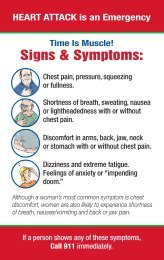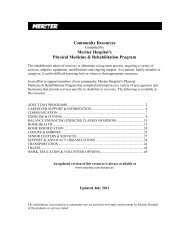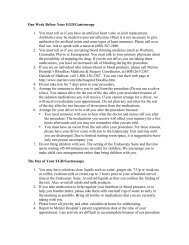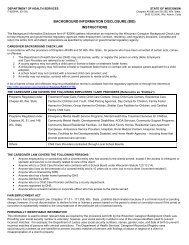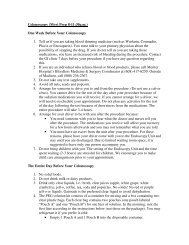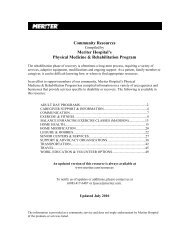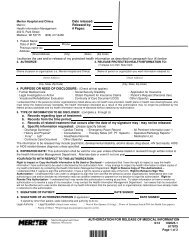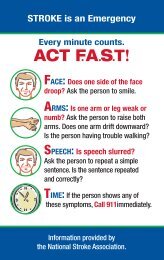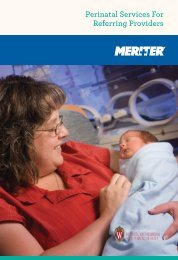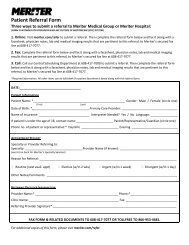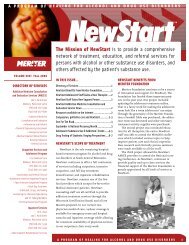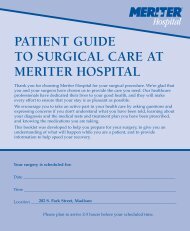A Guide To Your New Family's First Weeks - Meriter Health Services
A Guide To Your New Family's First Weeks - Meriter Health Services
A Guide To Your New Family's First Weeks - Meriter Health Services
You also want an ePaper? Increase the reach of your titles
YUMPU automatically turns print PDFs into web optimized ePapers that Google loves.
Baby Blues<br />
The most common, least severe and best known of<br />
all postpartum reactions, “baby blues” are common<br />
during the first few days, usually appearing suddenly<br />
on the third or fourth day following delivery.<br />
Estimates are that 50-75 percent of new mothers<br />
experience a sense of let down after the emotionally<br />
charged experience of giving birth.<br />
These emotions are briefly unpleasant and usually<br />
disappear on their own, often as quickly as they<br />
came. Signs of the blues may include:<br />
• Crying for no apparent reason<br />
• Irritability<br />
• Impatience<br />
• Restlessness<br />
• Anxiety<br />
<strong>To</strong> help cope with the blues:<br />
• Rest when your baby sleeps<br />
• Eat healthy foods<br />
• Take care of yourself<br />
• Ask for and accept help from others<br />
• Take a break from your baby and let someone<br />
else care for the baby for a while<br />
Postpartum Depression<br />
<strong>New</strong> mothers may experience different levels of<br />
postpartum depression. Postpartum depression can<br />
occur within days or appear gradually, sometimes up<br />
to a year after delivery. Symptoms may include:<br />
• Nervousness and anxiety<br />
• Sluggishness<br />
• Exhaustion<br />
• Sadness and hopelessness<br />
Feelings After Birth<br />
Following the birth of your baby, many emotions are normal. Often, you will feel excitement and joy, along with relief...<br />
the long wait is finally over!<br />
Sometimes, however, women may experience emotions that are unsettling, even frightening. Mothers may feel overwhelmed,<br />
anxious or uncertain. Regardless of how much you prepared or how much you looked forward to your baby’s<br />
birth, this first year may include unexpected “lows.” Such emotions can affect any woman who has had a baby, regardless<br />
of how she felt after the births of previous children.<br />
The following information describes the common “blues” that new moms may feel, and more severe reactions that may<br />
require medical help.<br />
“Of all human experiences,<br />
birth is filled<br />
with more emotion<br />
than any other event.”<br />
57<br />
• Appetite and sleep disturbances<br />
• Poor concentration, memory loss and confusion<br />
• Over-concern for your baby<br />
• Uncontrollable crying<br />
• Lack of interest in your baby<br />
• Feelings of guilt or inadequacy<br />
• Fear of harming self or baby<br />
• Inability to care for self or baby<br />
Mothers suffering from postpartum depression may<br />
experience one or more of these symptoms in any<br />
combination. They may change from day to day, with<br />
good days alternating with bad. Symptoms may range<br />
from mild to severe.<br />
If you experience any of the above<br />
symptoms for more than a week, let<br />
your health care providers know. Tell<br />
them how you are feeling. The sooner<br />
you seek help, the sooner you will feel<br />
better so you can enjoy your new baby<br />
and your lives together.<br />
Postpartum Psychosis<br />
Postpartum psychosis, while quite rare, is a serious<br />
emergency and requires immediate medical attention.<br />
The psychosis usually develops within the first two<br />
weeks after delivery.<br />
Symptoms are much exaggerated and may include:<br />
• Insomnia<br />
• Hallucinations<br />
• Agitation<br />
• Bizarre feelings and behavior



